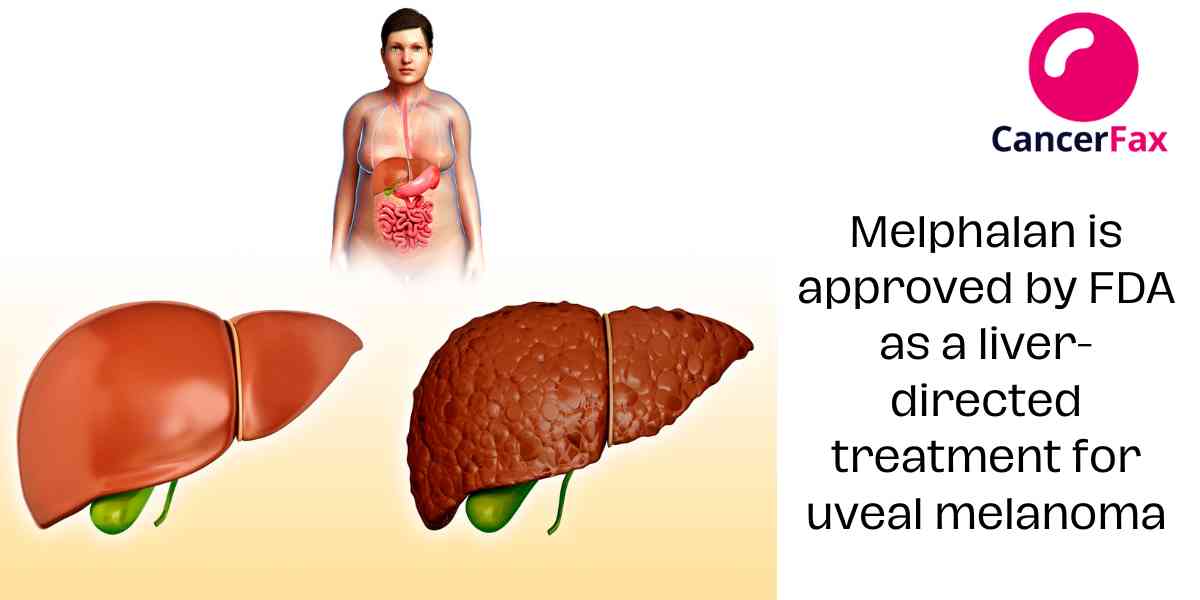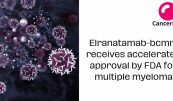Melphalan is approved by FDA as a liver-directed treatment for uveal melanoma
Nov 2023: The Food and Drug Administration approved HEPZATO KIT (melphalan for Injection/Hepatic Delivery System, Delcath Systems, Inc.) as a liver-directed treatment for adult patients with uveal melanoma who have unresectable hepatic metastases that affect less than 50% of the liver and no extrahepatic disease, or extrahepatic disease that is limited to the lung, bone, lymph nodes, or subcutaneous tissues and can be
In the FOCUS study (NCT02678572), 91 people with uveal melanoma and liver metastases that could not be removed took part in a single-arm, open-label experiment to see how well the treatment worked. If the most dangerous part of the uveal melanoma came from the liver and the disease outside the liver could be treated with radiation therapy or surgery, then some disease outside the liver could be found in the lung, lymph nodes, bone, or under the skin. Important reasons for not being eligible were having metastases in at least 50% of the liver parenchyma, having Child-Pugh Class B or C cirrhosis, or having hepatitis B or C.
The main ways to measure how well something worked were the objective response rate (ORR) and the duration of response (DoR), which were decided by a fair central review committee using RECIST v1.1. The median DoR was 14 months (95% CI: 8.3, 17.7), and the ORR was 36.3% (95% CI: 26.4, 47).
Melphalan (HEPZATO) is infused into the hepatic artery every 6 to 8 weeks for a maximum of 6 infusions using the Hepatic Delivery System (HDS), a component of the device. Based on ideal body weight, the suggested melphalan dose is 3 mg/kg, with a maximum dose of 220 mg in a single therapy.
There is a Boxed Warning regarding serious peri-procedural consequences, such as bleeding, liver damage, and thromboembolic events, in the prescribing material for the HEPZATO KIT. A Boxed Warning regarding myelosuppression and the potential for serious infection, haemorrhage, or symptomatic anaemia is also included in the prescribing material.
Due to the potential for serious peri-procedural consequences such as thromboembolic events, hepatocellular damage, and haemorrhage, HEPZATO KIT is only accessible through a restricted programme that falls under the HEPZATO KIT Risk Evaluation and Mitigation Strategy.
Thrombocytopenia, fatigue, anaemia, nausea, musculoskeletal pain, leukopenia, abdominal pain, neutropenia, vomiting, increased alanine aminotransferase, prolonged activated partial thromboplastin time, increased aspartate aminotransferase, increased blood alkaline phosphatase, and dyspnea were the most common (≥20%) adverse reactions or laboratory abnormalities.
HEPZATO and the HEPZATO KIT are contraindicated in patients with active intracranial metastases or brain lesions with a propensity to bleed; liver failure, portal hypertension, or known varices at risk for bleeding; surgery or medical treatment of the liver in the previous 4 weeks; uncorrectable coagulopathy, inability to safely undergo general anesthesia, including active cardiac conditions including, but not limited to, unstable coronary syndromes (unstable or severe angina or myocardial infarction), worsening or new-onset congestive heart failure, significant arrhythmias, or severe valvular disease; history of allergies or known hypersensitivity to melphalan; history of allergies or known hypersensitivity to a component or material utilized within the HEPZATO KIT including history of allergy to natural rubber latex; history of allergy or hypersensitivity to heparin or presence of heparin-induced thrombocytopenia (HIT); and history of severe allergic reaction to iodinated contrast not controlled by premedication with antihistamines and steroids.
View full prescribing information for the HEPZATO KIT.
Dr. Nishant Mittal is a highly accomplished researcher with over 13 years of experience in the fields of cardiovascular biology and cancer research. His career is marked by significant contributions to stem cell biology, developmental biology, and innovative research techniques.
Research Highlights
Dr. Mittal's research has focused on several key areas:
1) Cardiovascular Development and Regeneration: He studied coronary vessel development and regeneration using zebrafish models1.
2) Cancer Biology: At Dartmouth College, he developed zebrafish models for studying tumor heterogeneity and clonal evolution in pancreatic cancer.
3) Developmental Biology: His doctoral work at Keio University involved identifying and characterizing medaka fish mutants with cardiovascular defects.
4) Stem Cell Research: He investigated the effects of folic acid on mouse embryonic stem cells and worked on cryopreservation techniques for hematopoietic stem cells.
Publications and Presentations
Dr. Mittal has authored several peer-reviewed publications in reputable journals such as Scientific Reports, Cardiovascular Research, and Disease Models & Mechanisms1. He has also presented his research at numerous international conferences, including the Stanford-Weill Cornell Cardiovascular Research Symposium and the Weinstein Cardiovascular Development Conference.
In summary, Dr. Nishant Mittal is a dedicated and accomplished researcher with a strong track record in cardiovascular and cancer biology, demonstrating expertise in various model systems and a commitment to advancing scientific knowledge through innovative research approaches.
- Comments Closed
- November 23rd, 2023






hepatic-directed therapy uveal melanoma, HEPZATO KIT approval, liver metastasis treatment, melphalan chemosaturation, melphalan FDA approval, ocular melanoma therapy, orphan drug designation melanoma, percutaneous hepatic perfusion
CancerFax is the most trusted online platform dedicated to connecting individuals facing advanced-stage cancer with groundbreaking cell therapies.
Send your medical reports and get a free analysis.
🌟 Join us in the fight against cancer! 🌟
Привет,
CancerFax — это самая надежная онлайн-платформа, призванная предоставить людям, столкнувшимся с раком на поздних стадиях, доступ к революционным клеточным методам лечения.
Отправьте свои медицинские заключения и получите бесплатный анализ.
🌟 Присоединяйтесь к нам в борьбе с раком! 🌟